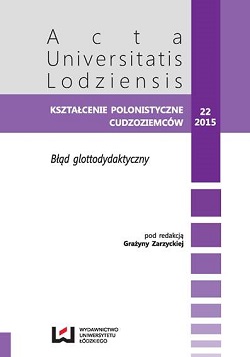Sposoby badania błędów w glottodydaktyce. Przegląd wybranych koncepcji
DOI:
https://doi.org/10.18778/0860-6587.22.03Słowa kluczowe:
lapsologia, metodologia glottodydaktyczna, behawioryzm, kognitywizm, szkoła dialogicznaAbstrakt
Celem niniejszego artykułu jest analiza sposobów badania błędów popełnianych przez uczących się języków obcych. Przegląd koncepcji umieszczonych w artykule jest oparty na pracach glottodydaktyków amerykańskich i przedstawia zarazem główne szkoły glottodydaktyki amerykańskiej – behawioryzm, kognitywizm oraz tzw. szkołę dialogiczną. Autor analizuje zarówno koncepcje pojęcia błędu w każdej ze szkół, jak i sposoby ich badania.
Bibliografia
Aljaafreh A., Lantolf J., 1994, Negative Feedback as Regulation and Second Language Learning in the Zone of Proximal Development, „Modern Language Journal” 78, s. 465–83.
Google Scholar
DOI: https://doi.org/10.1111/j.1540-4781.1994.tb02064.x
Bailey N., Madden C., Krashen S., 1974, Is There a ‘Natural Sequence, „Adult Second Language Learning? Language Learning” 24, No. 2, s. 235–43.
Google Scholar
DOI: https://doi.org/10.1111/j.1467-1770.1974.tb00505.x
Bausch K. R., Raabe H., 1978, Zur Frage der Relevanz von kontrastiver Analyse, Fehleranalyse und Interimsprachenanalyse für den Fremdsprachenunterricht, „Materialien Deutsch als Fremdsprache “Kontrastivität – Fehleranalyse – Unterrichtspraxis Deutsch als Fremdsprache”, Heft 9, s. 21–57.
Google Scholar
Bednarska K., 2014, Rola transferu językowego w nauczaniu języka polskiego Słoweńców, Łódź, Wydawnictwo Uniwersytetu Łódzkiego.
Google Scholar
Bley-Vroman R., 1989, What Is the Logical Problem of Foreign Language Learning?, S. Gass, and J. Schachter (red.), Linguistic Perspectives on Second Languag Acquisition, Cambridge, s. 41–68.
Google Scholar
DOI: https://doi.org/10.1017/CBO9781139524544.005
Brown R. W., Fraser C., 1964, The acquisition of Syntax, U. Bellugi, R. Brown (red.), The acquisition of Language Monograph of the Society of Research in Child Development, Vol. 29, No. 1.
Google Scholar
DOI: https://doi.org/10.2307/1165754
Chomsky N., 1959, Review of ‘Verbal Behavior’ by B. F. Skinner, „Language” 35, s. 26–58.
Google Scholar
DOI: https://doi.org/10.2307/411334
Corder S., 1967, The Significance of Learners’ Errors, „International Review of Applied Linguistics” 5, No. 4, s. 161–70.
Google Scholar
DOI: https://doi.org/10.1515/iral.1967.5.1-4.161
Débyser F., 1967, Grille de classement typologique des fautes, Paris.
Google Scholar
Dulay H., Burt, M., 1974, Natural Sequences in Child Second Language Acquisition, „Language Learning 24”, s. 37– 53.
Google Scholar
DOI: https://doi.org/10.1111/j.1467-1770.1974.tb00234.x
Ellis R., 1994, The Study of Second Language Acquisition, Oxford University Press.
Google Scholar
Fisiak J., 1981, Contrastive Linguistics and the Language Teacher, Oxford Pergamon.
Google Scholar
Gass S. M., Sellinker L., 2001, Second language acquisition. Introductory course, New York, Routledge.
Google Scholar
DOI: https://doi.org/10.4324/9781410604651
Harré R., Gillett G., 1994, The Discursive Mind. Thousand Oaks, Sage.
Google Scholar
DOI: https://doi.org/10.4135/9781452243788
Hymes D., 1972, On Communicative Competence, J. Pride, J. Holems (red.) Sociolinguistics, Harmondsworth, s. 269–93.
Google Scholar
Johnson M., 2004, Philosophy of Second Language Acquisition. New Haven, Yale University Press.
Google Scholar
Kielhofer B., 1975, Fehlerlinguistik des Fremdsprachenerwerbs. Linguistische, lernpsychologische und didaktische Analyse von Französischfehlern, Kronberg/Ts., Scriptor Verlag.
Google Scholar
Krashen S., 1985, The Input Hypothesis: Issues and Implications, London.
Google Scholar
Lado R., 1957, Linguistics Across Cultures, w: Applied Linguistics for Language Teachers, Ann Arbor, University of Michigan Press.
Google Scholar
Markee N., 1994, Toward an Ethnomethodological Respecification of Second Language Acquisition Studies, w: Research Methodology in Second-Language Acquisition, Hillsdale, s. 89–116.
Google Scholar
Nemser W., 1971, Approximative Systems of Foreign Language Learners, „IRAL” 9, s. 115-123.
Google Scholar
DOI: https://doi.org/10.1515/iral.1971.9.2.115
Nickel, G., 1972, Fehlerkunde, Beiträge zur Fehleranalyse, Fehlerbewertung, Fehlertherapie, Berlin.
Google Scholar
Ochsner R., 1979, A Poetics of Second-Language Acquisition, „Language Learning” 29, no. 1, s. 53–80.
Google Scholar
DOI: https://doi.org/10.1111/j.1467-1770.1979.tb01052.x
Rommetveit R., 1987, Meaning, Context, and Control: Convergent Trends and Controversial Issues in Current Social-Scientific Research on Human Cognition and Communication, „Inquiry” 30, s. 79–99. Rommetveit R., 1992, Outlines of a Dialogically Based Social-Cognitive Approach to Human Cognition and Communication, A. Heen Wold (ed.), The Dialogical Alternative: Towards a Theory of Language and Mind, Oslo, s. 19–44.
Google Scholar
DOI: https://doi.org/10.1080/00201748708602111
Schachter J., 1974, An error in error analysis. Language Learning, s. 205–214.
Google Scholar
DOI: https://doi.org/10.1111/j.1467-1770.1974.tb00502.x
Selinker L., 1972, Interlanguage, „International Review of Applied Linguistics” 10, s. 209–31.
Google Scholar
DOI: https://doi.org/10.1515/iral.1972.10.1-4.209
Vygotsky L., 1978, Mind in Society. The Development of Higher Psychological Processes, Cambridge, Harvard University Press.
Google Scholar
Vygotsky L., 1981, The Genesis of Higher Mental Functions, „The Concept of Activity in Soviet Psychology”, Armonk.
Google Scholar
Vygotsky L., 1986, Thought and Language, Cambridge, MIT Press.
Google Scholar
Washburn G., 1998, Working in the ZPD: Fossilized and Nonfossilized Nonnative Speakers, J. Lantlof, G. Appel (red.), Vygotskian Approaches to Second Language Research, Norwood, s. 69–80.
Google Scholar
Wode H., 1978, Fehler, Fehleranalyse und Fehlerbenotung im Lichte des natürlichen L-2-Erwerbs, „Linguistik und Didaktik“ 34/35, s. 233-245.
Google Scholar
DOI: https://doi.org/10.30965/25890859-0090203012
Young R., 1999, Sociolinguistic Approaches to SLA, „Annual Review of Applied Linguistics” 19, s. 105–32.
Google Scholar
DOI: https://doi.org/10.1017/S0267190599190068
Pobrania
Opublikowane
Jak cytować
Numer
Dział
Licencja

Utwór dostępny jest na licencji Creative Commons Uznanie autorstwa – Użycie niekomercyjne – Bez utworów zależnych 4.0 Międzynarodowe.










